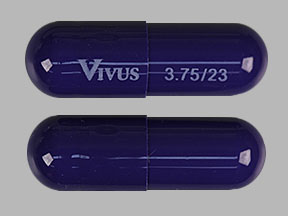Qsymia Interactions
There are 417 drugs known to interact with Qsymia (phentermine/topiramate), along with 21 disease interactions, and 3 alcohol/food interactions. Of the total drug interactions, 150 are major, 264 are moderate, and 3 are minor.
- View all 417 medications that may interact with Qsymia
- View Qsymia alcohol/food interactions (3)
- View Qsymia disease interactions (21)
Most frequently checked interactions
View interaction reports for Qsymia (phentermine / topiramate) and the medicines listed below.
- albuterol
- amlodipine
- atorvastatin
- bupropion
- clonazepam
- Contrave (bupropion / naltrexone)
- cyclobenzaprine
- gabapentin
- hydrochlorothiazide
- hydroxyzine
- ibuprofen
- levothyroxine
- lisinopril
- losartan
- meloxicam
- metformin
- montelukast
- omeprazole
- pantoprazole
- phentermine
- prednisone
- rosuvastatin
- spironolactone
- Synthroid (levothyroxine)
- topiramate
- tramadol
- trazodone
- Vitamin B12 (cyanocobalamin)
- Vitamin C (ascorbic acid)
- Vitamin D3 (cholecalciferol)
Qsymia alcohol/food interactions
There are 3 alcohol/food interactions with Qsymia (phentermine / topiramate).
Qsymia disease interactions
There are 21 disease interactions with Qsymia (phentermine / topiramate) which include:
- cardiovascular
- glaucoma
- oligohidrosis/hyperthermia
- agitation
- cardiac disease
- glaucoma
- hypertension
- psychiatric disorders
- pulmonary hypertension
- substance abuse
- suicidal tendency
- renal dysfunction
- metabolic acidosis
- renal dysfunction
- diabetics
- dialysis
- liver disease
- angle closure glaucoma
- hemodialysis
- liver disease
- nephrolithiasis
More about Qsymia (phentermine / topiramate)
- Qsymia consumer information
- Compare alternatives
- Pricing & coupons
- Reviews (566)
- Drug images
- Side effects
- Dosage information
- During pregnancy
- Generic availability
- Support group
- FDA approval history
- Drug class: anorexiants
- En español
Related treatment guides
Drug Interaction Classification
| Highly clinically significant. Avoid combinations; the risk of the interaction outweighs the benefit. | |
| Moderately clinically significant. Usually avoid combinations; use it only under special circumstances. | |
| Minimally clinically significant. Minimize risk; assess risk and consider an alternative drug, take steps to circumvent the interaction risk and/or institute a monitoring plan. | |
| No interaction information available. |
Further information
Always consult your healthcare provider to ensure the information displayed on this page applies to your personal circumstances.


